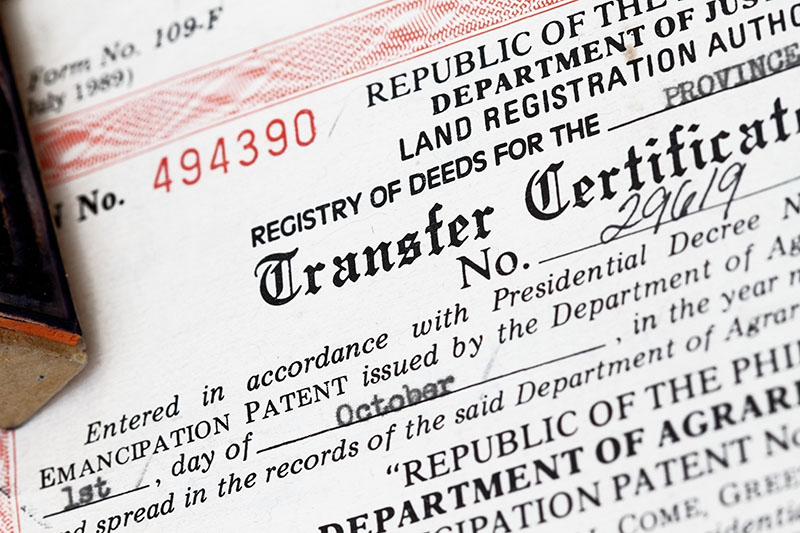Transferring the title or deed of a property is an intricate process, especially in the Golden State. Whether you’re in bustling Los Angeles County or the serene Napa Valley, the procedure remains quite consistent. Here, we’ll unravel the details of transferring deeds in California.
Transfer to Family Members
In California, transferring ownership of a house to a family member is common. This can be done using a grant deed or a quitclaim deed. However, grant deeds are preferable as they guarantee that the property hasn’t been sold to someone else. A quitclaim deed does not provide such assurance.
Legal Implications
Any transfer of ownership has its legal implications. For instance, when transferring a house title, property taxes might be reassessed, potentially increasing them. However, certain family transfers, like parent-to-child or between spouses, might qualify for a property tax reassessment exclusion.
Special Considerations
Deed Recording: Once the deed transfer form is executed, it must be recorded with the county where the property is located. In Los Angeles County, for example, this means bringing the document to the Los Angeles County Recorder’s office.
Transfer Deed After Death: California allows for a Revocable Transfer on a Death Deed. If the property owner dies, the ownership is transferred directly to the named beneficiary without going through probate.
Common Problems
Transferring a title in California, while routine, can present several common challenges. A frequent issue is the discovery of undisclosed liens or encumbrances on the property, which can obstruct the transfer process. Additionally, title discrepancies arising from clerical errors or inaccuracies in previous deeds can cause delays. In certain cases, property taxes might be reassessed after a title transfer, leading to unexpected financial burdens. Moreover, misunderstandings about transfer taxes, especially when transferring between family members, can lead to unplanned costs. Lastly, failure to properly notarize and record the new deed can result in the invalidation of the transfer, requiring the process to be redone.
Forms Needed
Key forms required include the Preliminary Change of Ownership Report and the deed form (either grant or quitclaim). These need to be notarized and recorded.
Transfer Ownership Without Selling
It’s possible to transfer ownership of a house without selling it. This can be useful for estate planning, moving property into a trust, or gifting property to charity.
Proof of Transfer
After recording the deed, the county will return the original deed, now stamped as recorded, to the new owner as proof of ownership.
Business Ownership
In California, transferring a title of a property that’s under business ownership introduces an additional layer of complexity. When a property is owned by a business entity, such as a corporation, LLC, or partnership, the legal structure of the business and its operating agreements can significantly influence the transfer process. It’s vital to ensure that any title transfer aligns with the entity’s bylaws and doesn’t infringe on shareholders’ or members’ rights.
Additionally, potential tax implications for the business, like capital gains or transfer taxes, need to be thoroughly evaluated. Furthermore, when transferring property as part of a business sale or restructuring, there may be contractual obligations or liens that impact the transaction. Due to these intricacies, involving legal counsel experienced in both real estate and corporate law is often essential for such transactions in California.
The Role of a Lawyer
In California, the role of a lawyer during a title transfer is multifaceted and often invaluable. A lawyer provides guidance, ensuring that all legal procedures and requirements are met accurately and timely. They review the property’s title to identify any undisclosed liens, encumbrances, or title defects that might hinder the transfer process.
Furthermore, they advise on the potential tax implications and help navigate the complexities of transfer taxes or exclusions, particularly in special cases like family transfers. A lawyer also assists in drafting, reviewing, and ensuring the proper execution of the deed, safeguarding the interests of all parties involved. In transactions that might have contractual or business considerations, the lawyer’s expertise ensures that the title transfer aligns with existing agreements or business structures. In essence, a lawyer’s role is to facilitate a smooth, legally compliant title transfer while minimizing risks for their client.
Considering Charity
When a property is donated to a charity, the title must be transferred to the charitable organization through the execution and recording of an appropriate deed. This process allows the charity to gain legal ownership of the property. For the donor, this act of generosity can offer potential tax deductions based on the property’s fair market value. However, both the donor and the charity should consult legal and tax professionals to ensure compliance with state regulations and to maximize any potential tax benefits from the donation.
Conclusion
Transferring a deed in California, especially in populous regions like Los Angeles County, requires careful attention to detail. Whether you’re managing a deed transfer after the death of a loved one or looking to gift your property to a child or charity, understanding the nuances will ensure a smooth transition. Always consider consulting with a real estate lawyer to navigate the complexities of title and deed transfers in California.
How Property Records of California Can Help
Property Records of California stands as a beacon of efficiency and reliability for homeowners looking to transfer titles. With a deep understanding of the Golden State’s intricate property laws and a wealth of experience under its belt, the company streamlines the transfer process, making it hassle-free for homeowners. Their expert team provides step-by-step guidance, ensuring all necessary documentation is in place, and offers solutions to potential challenges like undisclosed liens or title discrepancies. By partnering with Property Records of California, homeowners can rest assured that their title transfer is in expert hands, facilitating a smooth transition of property ownership.





